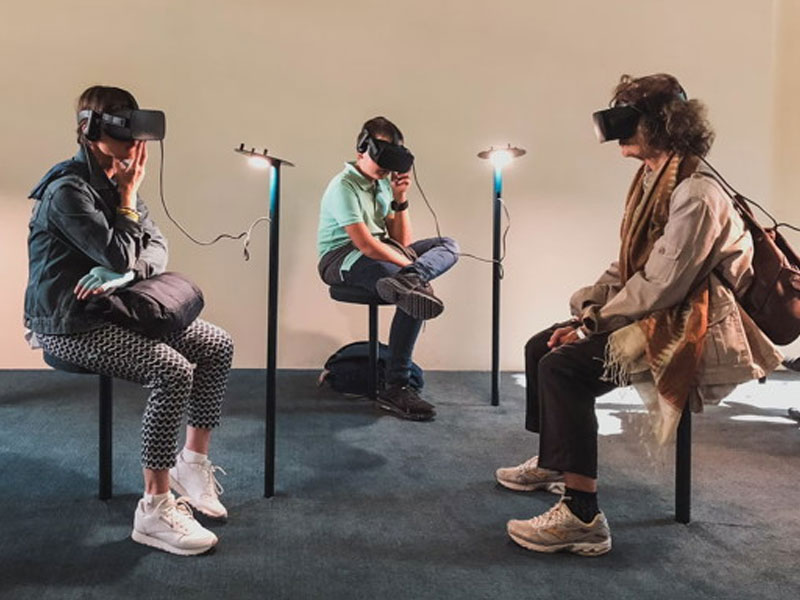Warming up to the Future of Retail: Customer Centric, Technology First
SOURCE: HTTPS://WWW.INDIANRETAILER.COM/
NOV 06, 2023
Why the 'Metaverse represents a revolution in advertising - adage
SOURCE: HOTELNEWSRESOURCE.COM
OCT 20, 2021

The “metaverse” is the next great revolution in computing. This concept of the future of the internet promises to bring the physical world together with new technologies that are only starting to transform the way people interact with one another, amuse themselves, go shopping and engage in other everyday activities.
Isabel Perry, director of technology at Byte (part of Dept) noted, "Metaverses are jam-packed with innovative marketing potential, (ranging) from live shopping to virtual stores, fashion shows, product launches, content production, live flagship events, enhanced social, pimping-up of Zoom calls and NFTs paving the way for real economies. The possibilities that this hybrid digital/physical world offers are near-endless. It's time for forward-thinking brands to get involved.”
The metaverse signals a move beyond traditional advertising toward creating brand experiences that are more engaging and exciting and less invasive than what we experience with digital advertising today.
Conventional offline and online advertising methods such as flagship shops, large billboards and other types of traditional offline and internet advertising are becoming a thing of the past. Every age group, from the very young to the very old, is becoming engaged by new innovations, ranging from contextual targeted advertisements to Instagram influencers all the way up to platforms such as Twitch, TikTok, Fortnite and Roblox.
For those looking to build a relationship with the new generation of consumers today, the phrase “in real life” has taken on a whole new significance. Digital alone is not sufficient; it must also be interesting, meaningful and immersive. And this is precisely what the metaverse will accomplish for brands in the near future.
For example, Balenciaga launched its dystopian game Afterworld, showcasing its futuristic clothing line. Fortnite, a player-versus-player game played by hundreds of millions in the Gen Z age group, collaborated with Nike to promote its new Jordan sneakers and teamed up with rapper Travis Scott for a virtual gig to an audience of over 10 million. And the hugely popular esports game League of Legends collaborated with Louis Vuitton for its latest world championship.
Among other examples, Nike materialized virtual stores for its Air Max 720, calling out physical lines in shopping streets as: "so 2k18.” Meanwhile, ComplexLand recently had an interesting take on the metaverse by creating a free, open-world, shoppable virtual destination. And non-traditional games like Axie Infinity even take these new virtual worlds and mix them with real-world economics, allowing many individuals to rely on this as their primary source of income.
Hardware is becoming more compact, quicker and more intelligent. Thanks to 5G, almost everywhere now has fast, dependable connectivity. In the metaverse, computer vision is becoming more intelligent, allowing for both visual and audible help. All of this contributes to the immersion of the experience, making the transfer of knowledge and experience more rewarding and human.
Paul Doyle, director of product management for Unreal Engine at Epic Games put it best: "Much like the internet and mobile technology were major transformations and major technical ages, now we're about to hit a virtual age. And it's going to be awesome.”
This is essential for businesses who want to put their customers first. And the metaverse is rapidly becoming the focal center of all of this activity.
LATEST NEWS
Augmented Reality
Hi-tech smart glasses connecting rural and remote aged care residents to clinicians
NOV 20, 2023
WHAT'S TRENDING


Data Science
5 Imaginative Data Science Projects That Can Make Your Portfolio Stand Out
OCT 05, 2022

SOURCE: HTTPS://WWW.INDIANRETAILER.COM/
NOV 06, 2023
SOURCE: HTTPS://DIGIDAY.COM/
SEP 22, 2023
SOURCE: HTTPS://WWW.EXCHANGE4MEDIA.COM/
AUG 21, 2023
SOURCE: HTTPS://WWW.SCIENCEDAILY.COM/
AUG 14, 2023
SOURCE: HTTPS://WWW.EY.COM/EN_IN/FUTURE-CONSUMER-INDEX/CONSUMER-IS-THE-KING-CONSUMER-EXPERIENCE-IS-THE-PRIORITY
JUN 30, 2023
SOURCE: HTTPS://WWW.PITCHONNET.COM/MARKETING-MOMENTS/HOW-CREATIVE-TECH-IS-SCRIPTING-A-NEW-FUTURE-IN-INDIAN-ADVERTISING-32957.HTML
JUN 27, 2023
SOURCE: HTTPS://WWW.BUSINESSINSIDER.IN/BI-INTELLIGENCE/NEWS/CHATGPT-AND-GENERATIVE-AI-IN-MEDIA-AND-ADVERTISING-WITH-USE-CASES-SET-THE-BATTLE-FOR-HEARTS-AND-MINDS-BEGINS/ARTICLESHOW/100286369.CMS
JUN 26, 2023
SOURCE: ARIN WAICHULIS II HTTPS://9TO5MAC.COM/2023/01/22/APPLES-ICONIC-1984-SUPER-BOWL-AD-AIRED-ON-THIS-DAY-39-YEARS-AGO/
JAN 22, 2023